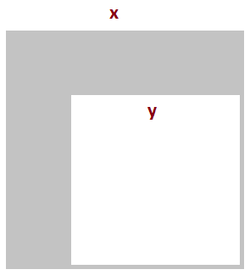Square in a square problem
 In the figure, the bigger square has side x meters and the smaller square has side y meters, where x and y are whole number. If the area of the shaded region is 49 square meters, what is its perimeter?
In the figure, the bigger square has side x meters and the smaller square has side y meters, where x and y are whole number. If the area of the shaded region is 49 square meters, what is its perimeter?
The answer is 100.
This section requires Javascript.
You are seeing this because something didn't load right. We suggest you, (a) try
refreshing the page, (b) enabling javascript if it is disabled on your browser and,
finally, (c)
loading the
non-javascript version of this page
. We're sorry about the hassle.
1 solution
The smaller square are completely inside the bigger square and it doesn't touch the bigger square as shown in figure. Note that, there are gaps from the FOUR sides around the smaller square. In this case the perimeter is 4 * y + 4 * x .
Log in to reply
Sorry for the figure. Two sides (left and bottom) of the smaller square must touch the sides of the bigger square.
Why did you equate (x+y)(x-y) to 49*1? What if I change the area to 36 square meters?
Log in to reply
He equated (x+y)(x-y) to 49 x 1 like this: the area of the shaded region is A = x 2 − y 2 which factors as x 2 − y 2 = ( x + y ) ( x − y ) . Since you told us it is 4 9 , he equated ( x + y ) ( x − y ) = 4 9 . Then since we are dealing with positive whole numbers, and the only divisors of 4 9 are 4 9 , 7 , 1 , the only valid solution is (x+y) = 49 and (x-y) = 1 (if x+y = 7, then y=0, so it is not valid.)
The shaded region is x2 – y2 = 49 , (x+y)(x – y) = 49 x 1, x+y=49, x – y =1, So x=25, y=24. The perimeter of the shaded region is 4(x – y) + 4y = 4x = 100.